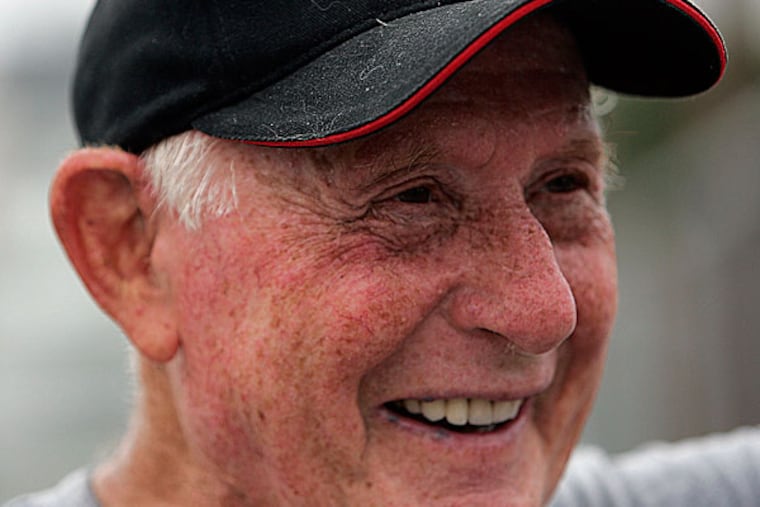Red Klotz, Washington Generals founder, dies at 93
Louis "Red" Klotz, 93, a Philadelphian whose basketball life spanned much of the game's history and produced a historic legacy of losing, died Saturday at his Margate, N.J., home.

Louis "Red" Klotz, 93, a Philadelphian whose basketball life spanned much of the game's history and produced a historic legacy of losing, died Saturday at his Margate, N.J., home.
Mr. Klotz won championships at South Philadelphia High, with the barnstorming Philadelphia Sphas and with the NBA's Baltimore Bullets.
But it was with the Washington Generals, the Harlem Globetrotters' longtime foils, that the 5-foot-7 redhead made a lasting impact.
Mr. Klotz, whose family still owns the team, founded the Generals in 1952. Through nearly 50 years as owner, coach and point guard, he lost an estimated 15,000 games to basketball's showmen. In the process, he helped basketball boom.
"The Generals made history," Klotz told The Inquirer in 2006. "It had absolutely nothing to do with being the losingest team in the history of the world. We played in 117 countries. We were pioneers."
Trotters owner Abe Saperstein realized local opponents often weren't good enough to provide an entertaining show. Seeking a more consistent product, he asked Mr. Klotz to form a permanent opposition.
That team would be known as the Shamrocks, Seagulls, Reds, All-Stars, Nationals, and, most famously, Generals.
"The routs were boring for audiences," Mr. Klotz explained. "So the [Trotters] would do tricks. Abe understood the show-biz aspect. He allowed them to do their routines. But in between, his team played fundamental, straight-up basketball. That's why they endure."
Globetrotters CEO Kurt Schneider said in a statement Monday that "Red was truly an ambassador of the sport and as much a part of the Globetrotters' legacy as anyone. He was a legend and a global treasure."
Mr. Klotz played with the Generals until he was 68, then became their full-time coach. Into his 90s, he played regularly at the Jewish Community Center and the Jerome Avenue courts in Margate.
The son of a Jewish carpenter from Russia, Mr. Klotz discovered basketball at South Philadelphia's Thomas Junior High. At 10, he was playing in preliminaries against the legendary Sphas at the Broadwood Hotel.
He played briefly at Villanova before marriage and World War II intervened. He played in a variety of professional leagues, including the NBA.
His short stature and red hair made him a perfect Globetrotters foil. Legends Meadowlark Lemon and Goose Tatum yanked down his shorts, bounced balls off his head, and mimicked his set shot.
"I got involved in that stuff mainly to take it away from my players," Klotz said. "I wanted them to play ball and not feel like they were going to be humiliated."
He performed in front of popes, kings, and millions of ordinary citizens. He played behind the Iron Curtain, on an aircraft carrier, and in front of 75,000 in Berlin on a plywood floor perched atop beer barrels.
No one is certain of his Generals record, but Klotz's biographer, Tim Kelly, estimated it at 6-15,000.
The last victory, Mr. Klotz recalled, occurred 40 years ago, "somewhere in Tennessee."
"I once told [ex-Temple coach] Don Casey that Red lost 15,000 games," Kelly said, "He said, 'That alone ought to qualify him for the Hall of Fame.' "
Kelly long campaigned for Mr. Klotz to be inducted into the basketball Hall, which includes players, coaches, and "contributors."
"With the Generals, he contributed greatly to basketball's growth as the world's second most popular sport," Kelly said. "The fact that he isn't in the Hall is an unforgivable oversight."
Asked in 2006 about his chances, Mr. Klotz was sanguine.
"If it happens, it happens," he said. "How they select people is their business. Younger people don't even remember me."
Survivors include his wife of 72 years, Gloria; children Ronnee Groff, Chuck, Glenn, Kiki, Jodi Ferrara, and Kenneth; 12 grandchildren; and nine great-grandchildren.
Plans for a life celebration will be announced soon.